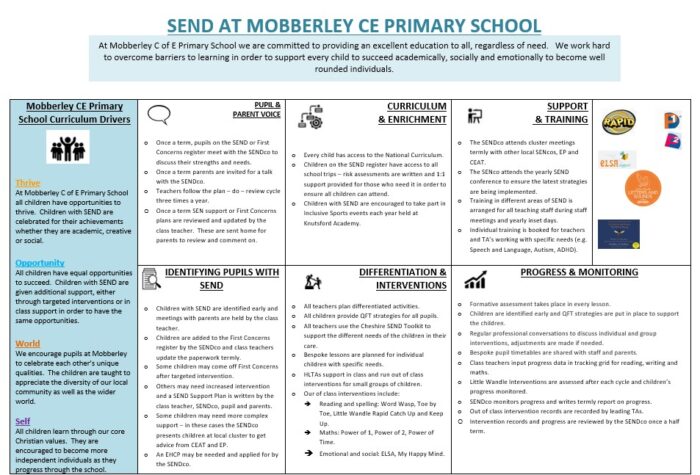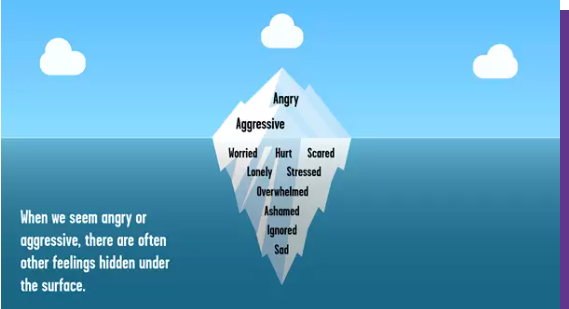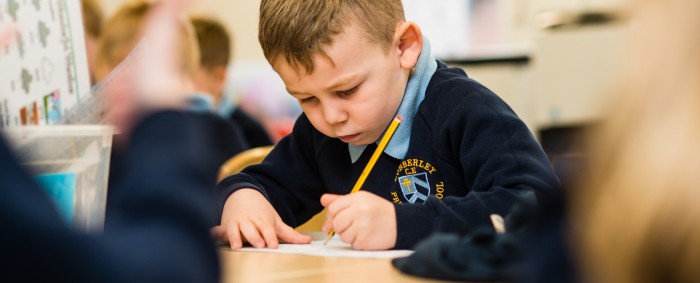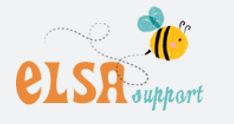SEND
At Mobberley C of E Primary School we have a whole school approach to supporting Special Educational Needs and Disability and use the guidance set out in The Equality Act 2010 and the SEN Code of Practice 2014.
We aim for every pupil to fulfill their potential, no matter what their needs. Our school welcomes all children and values them as individuals, treating them equally and with respect. We believe that all children have the right to have their own particular needs recognised and addressed in order to achieve success.
We believe that all teachers are teachers of children with special educational needs and it is therefore a whole school responsibility to ensure that these children’s needs are addressed. Through staff working together as a team, and in partnership with pupils and their parents and carers, we strive to ensure that all children have equal opportunities to succeed.
We believe it is essential to identify additional needs as early as possible so if you have any concerns please speak to your child’s class teacher or our school SENDCo.
Mrs Bentzien – SENDCo (NASENCO Qualified 2015)
Email cbentzien@mobberley.cheshire.sch.uk

My Happy Mind
We are very excited to announce that we will be continuing the My Happy Mind Curriculum academic year.
My Happy Mind is a science-backed programme grounded in the latest science and research about what it takes to create positive wellbeing.
Programme Structure
My Happy Mind is taught across five modules and each introduces a new set of content and habits to help children build resilience, self-esteem and confidence.
ELSA Intervention (SEMH intervention)
Mrs Knowles and Mrs Ashworth are our ELSA (Emotional Literacy Support Assistant) specialist teaching assistants. ELSAs are trained and regularly supervised by the Educational Psychologists in our Local Education Authority. An ELSA is a warm and caring person who wants to help your child feel happy in school and to reach their potential educationally. Their aim is to remove the barriers to learning and to have happy children in school and at home.
We offer this intervention for children identified by parents or staff as needing support in the following areas; Friendship, Self-esteem, Emotion Management, Resilience, Bereavement, Social Skills, Behaviour and Conflict Resolution.
Click here to view the information leaflet for ELSA.
Click here to visit the ELSA website.
SEND Policies and Information
Click here to view the SEND Information Report 2023 – 2024
Click here to view the SEND Policy 2024/2025
Click here to view our Whole School QFT Approaches
Click here to view the Wellbeing Policy
Click here to view our Local Offer 2024/2025
Click here to view our Accessibility Plan
Click here to view SEND Information for Parents
Click here to view the Special Educational Needs and Disabilities guide for parents and carers.
Click here to view a Parent Guide for Challenging Behaviour from Young Minds
You can also take a look at the new Cheshire East website called ‘Livewell’ which has information for everything that is available in Cheshire East.
Livewell link.
It also includes the new Cheshire East Toolkit for Inclusion which shows how childrens’ SEN needs are met in the authority and in schools.
The Cheshire East Toolkit for Inclusion is aimed at all educational providers and settings supporting Cheshire East children and young people aged 0-25 years.
It outlines the provision and support that Cheshire East Council expects to be in place in all educational settings which support Cheshire East children and young people, including those with SEN, and therefore forms an important part of the Cheshire East Local Offer for SEND.
Its purpose is to provide detailed guidance on how educational settings can identify children and young people with different types and levels of need, along with information on appropriate steps and strategies to support them. It also provides clear information about inclusive practice, reasonable adjustments and SEN Support. It also details when a request for an Education, Health and Care needs assessment, or specialist services, may be required.
Cheshire East Toolkit for Inclusion 2024 updated link.
Click here to view SEND Pupil Voice 2023
Information for Parents about Challenging Behaviour

What is challenging behaviour?
Just like us, children behave differently at different times. Feeling upset, sad, cross, frustrated and
lots of other kinds of emotions is a normal and healthy part of their life. Many children go through
phases of testing boundaries, and they are likely to behave in ways that are harder to manage when
they are tired, ill or stressed. It is normal for younger children to have tantrums sometimes, while
older children may sometimes shout, storm out or lash out.
When we talk about ‘challenging behaviour’, we mean behaviours that are persistent and difficult for
both you and your child to manage – and that may have a significant impact on your child’s wellbeing,
daily routine, school life, and relationships with family and friends.
Examples of behaviour:
• Having lots of angry outbursts or ‘tantrums’
• Regularly shouting, swearing and being very argumentative
• Frequently shoving, hitting, biting and kicking other family members or children at school
• Kicking, hitting, smashing or damaging things in the home
• Regularly refusing boundaries and routines, including not wanting to respond to reasonable requests
• Behaving impulsively and taking physical risks – for example climbing in ways that are unsafe and breaking things
• Blaming others for their behaviour
• Being unkind or bullying towards other family members or children at school
• Persistently getting into trouble at school
• Refusing to engage in conversations about what’s going on or to access support
This behaviour can affect your child’s wellbeing by:
• Getting in the way of daily routines that are important for their wellbeing – such as sleeping, eating, being active and spending quality time with you
• Putting them or other people at risk of harm
• Preventing them from having positive experiences within the family or at school
• Negatively affecting their relationship with you
• Disrupting their learning and their ability to make friends at school
• Leaving them isolated and/or withdrawn
For both you and your child, this kind of behaviour can feel overwhelming – especially if it’s
happening on a daily or weekly basis. Remember that even when things feel really stuck, there are
things you can do to help your child find new ways of managing their feelings – please see the Parent Guidance Leaflet below which details ideas and strategies to help manage difficult behaviour at home.
Please click here to view the Parent Guide on Challenging Behaviour
Behaviour Management Courses for Parents
Timid to Tiger
email – parenting@justdropin.co.uk for more information on the next course dates.
Timid to Tiger is an entirely parenting-based approach to managing anxiety in children (available to parents of children aged 8-11). It is based on evidence that anxious children benefit substantially from a parenting style that is clear, calm and consistent.
The group aims to explore the role of anxiety within a family and how it develops. It is run weekly over an 8 week period:
1. Introduction to the program
2. Securing the parent-child bond through non-directive play
3. Understanding your child’s anxiety
4. Using praise to build children’s confidence and using rewards to help your child’s motivation
5. Setting limits on anxious children’s behaviour and using withdrawal of attention to manage children’s behaviour
6. Managing worry
7. Managing really difficult behaviour
8. Review and celebration
Mental Health and Wellbeing Support at Stable Minds Knutsford
Stable Minds CYP aims to help children get the mental health support needed. Stable Minds offers a number of specialised therapists who can provide 121 support, sandbox therapy, art therapy and workshops.
To join the waitlist for support or to find out more – click here.
Dyslexia Awareness
Seeing Dyslexia Differently video for children.
Xtraodinary People Made by Dyslexia book read by Princess Beatrice.
Dyslexia Explained – an ebook for parents and carers.
The Smallest Things Charity
Please click here to view information on Premature Births.
As a school, we are aiming for all staff to be aware of the needs of children born prematurely and how best we can support children and families. The information below is taken from The Smallest Things website.
“We know that starting school can be a big step in the journey for families after neonatal care, and many parents worry about the lasting impact of premature birth.
While being born early does not mean a child will have special educational needs, it does increase the chances.
Research tells us that children born prematurely are more likely to have poorer academic attainment and special educational needs compared to their classmates born at full term. While we know that those born extremely preterm (before 28 weeks’ gestation) are most likely to need extra support, research also highlights that children born just a few weeks early may still face difficulties at school.
The cognitive and learning difficulties most commonly associated with premature birth include slower processing speeds, difficulties with memory, poorer visual-spatial skills, attention difficulties and struggles with mathematics.
With an average of two to three children in every classroom being born early, we know that teachers can play a crucial role in supporting and making a difference to the lives of children born prematurely.” – The Smallest Things Charity.
Dyslexia Information for Parents (10 Facts Parents Should Know About Dyslexia – Nessy – British English)
Useful Information and Websites for Parents and Carers
Cheshire East Autism Team (CEAT)
Local offer for SEND – https://www.cheshireeast.gov.uk/livewell/local-offer-for-children-with-sen-and-disabilities/education/supporting-send-in-education/pupils-with-asc/resources-for-parents-parents-and-family.aspx
CEAT provide an excellent service for families living with Autism (a diagnosis of ASC is not necessary.) They have a Family Liaison Officer, Janet Threader, who holds regular coffee mornings to meet parents and carers. Their website recommends resources and websites.
The CEAT team offers:
An open contact phone session, Tuesday afternoons 12.30-4.30pm (term time only). Phone 01625 378003 for general advice and information or to discuss specific concerns regarding individual pupils.
Autism Networks
A variety of support/groups available. Contact society for information.
Website: www.autismnetworks.org.uk
Telephone: 01270 580444 (Answer phone) or 0775 241 9271
E-mail: admin@autismnetworks.org.uk
address: The Old Railway Institute, Prince Albert Street, Crewe, CW1 2DF
Child and Adolsccent Mental Health (CAMHS)
Elm House is the base for our East Cheshire Child and Adolescent Mental Health service (CAMHS)
Address
Elm House, The Priory Unit,
Lea Bank Road (off Chester Road)
Macclesfield.
SK11 8QA
Telephone number 01625 712042 (0-16 years)
CAMHS also assess for Autism Spectrum Condition (ASC) and Attention Deficit Disorder (ADHD)
https://www.theaworlduk.com/ – The A World UK CIC is a non-profit organisation supporting the autistic community across the North of England.
http://space4autism.com/ – information about ASC workshops and events for children with autism
https://adoptioncounts.org.uk/ – adoption support for parents
http://www.bdadyslexia.org.uk – Dyslexia information and support
http://dyspraxiafoundation.org.uk – Dyspraxia information and support
http://www.autism.org.uk – Information and support about Autistic Spectrum Condition
http://www.youngminds.org.uk/for_children_young_people/whats_worrying_you/adhd?gclid=CN_S0JmvqdECFfgV0wodHiENJg – Information about ADHD and ADD
http://www.mymind.org.uk/thebox/ For Children and Young People – Mental Health and Wellbeing.
https://mindedforfamilies.org.uk/ For Families – Mental Health and Wellbeing.
https://www.stable-minds.co.uk/cyp For Mental Health Counselling support


